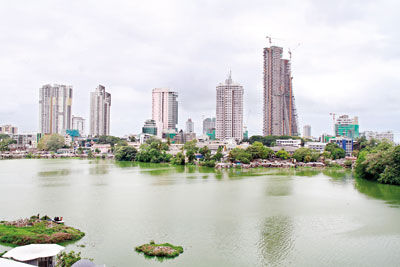News
Buyers advised not to fall for builders’ tall stories
Without examining building plans and development permits, or even titles and deeds at least, potential apartment buyers should not hand over millions to property developers who promise them a flat.

Colombo's fast changing skyline with apartment complexes and other high rise buildings coming up. Pic by Indika Handuwala
That may sound like common sense. But, for most, it may not be. Then again, some may argue such documents themselves may be fraudulent in a market crawling with real estate developers, who are encouraged by the ruling coalition.
Complaints by those who have been cheated have been rising, says the Urban Development Authority.
But it is powerless because, it says, local authorities approve some projects.
Chairman, Jagath Munasinghe, said most complaints relate to projects approved by local authorities.
In February, the UDA took over a portion of the approvals from local authorities and municipal councils.
A recent UDA survey has revealed that most complaints came from Dehiwala, Mount Lavinia, Kotte and Maharagama. The complaints include the building not conforming to specifications in the agreement and not being delivered on time.
Approvals for buildings can be granted only if the planning committee approves it. The panel consists of representatives of all stakeholders in the building industry including the Road Development Authority, Central Environment Authority, the UDA, technical officers and the local authorities.
However, he said that most plans are passed without approval from the planning committee. And there are instances when members who disagree with the majority’s decision are ignored or coerced. ‘‘We have to scrutinise all approvals and if it is not within the law we have no option but go to courts,’’ Mr Munsasinghe said.
The UDA now grants approvals for buildings of more than 4,000 square feet and over four stories. Also, buildings that could harm the environment and those built on heritage sites, environmentally sensitive sites, and sacred areas come under its purview.
Mr Munasinghe, said there is corruption in small projects where contractors use substandard materials, reduce the specified number of steel bars in beams that support structures, and compromise on the concrete mixture by reducing the ratio of cement.
“To stop this, all powers vested on local authorities should be withdrawn,’’ he said.
The industry regulator, the Construction Industries Development Authority, said the property developers are not covered by the Act related to the sector.
Director, Savindra Amarasinghe, said that to build any structure there should be a team of engineers, architects, and surveyors. The industry group is planning to include them in the new regulations that will bring the developers under its purview.
The group says construction sites should be monitored by the consultant and the client. The structural engineer has to answer for any structural failure of the building.
The industry body has drafted 35 regulations to monitor and regulate all developers.
The Chamber of Construction Industry said the UDA and the local authorities should police the developers.
President Ranjith Gunatilake, said new developers are entering the industry every day.
The local authorities and the UDA should give prospective developers a check list before they apply for a certificate of conformity.
Alternatively, those building their own homes by directly employing persons should check whether the contractors are credible. The industry body has a registered list of contractors, engineers and architects online.
Condominium Authority president, Christopher Wijeweera, charged: “We do not know who is influencing who over certification.’’
He is also concerned about high rises amid residential homes. “I am against this. Unfortunately, there are no laws against this,’’ he said.
He said that prospective buyers should should check the ownership of land by requesting for a certified copy of the title registration from local authorities, before any payment is done. Also they should check the street line certificates, electricity and water back up service and the drainage and waterways, he said.
| Advice from The Construction Industries Development Authority | |
| The Construction Industries Development Authority advises prospective buyers of apartments to:1. Check the background of contractors. 2. Do all payments through bank bonds 3. Agreements be done in the presence of lawyers 4. If the construction cost is over Rs. 10 million check with CIDA |
| The Chamber of Industry suggests the following: | |
| 1. The integrity of the property developer (whether the project management/ consultant are CIDA listed; their ratings) 2. The bank funding the project 3. Formal approval of the project from local authorities (do not go by approvals that are pending). 4. Ensure no post approval constructions are built (like addition of floors, side/rear ways and exits) 5. The structure is in compliance with Condominium Authority requirements 6. The developers financial stability/credibility, the ability to complete project on time. If there is a delay, the monthly compensation available. (This should be reflected in the sale and purchase agreement). |

